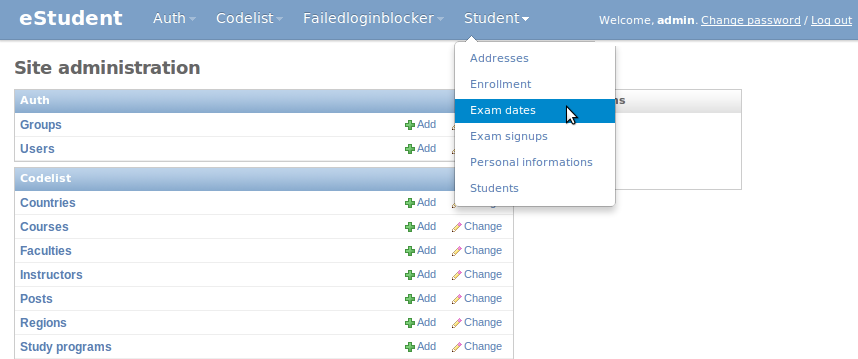Navbar in Django Admin
I wanted to add navigation to the Django top bar. The idea was that all of the installed apps should show up in the navbar beside the brand name. This is a screenshot of the working solution in action:
A solution
I hacked together a solution using a custom context processor in order to feed the installed applications to every template in the django admin site. I borrowed most of the code from the admin index view. context_processors.py:
from django.utils.text import capfirst
from django.db.models import get_models
from django.utils.safestring import mark_safe
from django.contrib.admin import ModelAdmin
from django.contrib.admin.validation import validate
# get_models returns all the models, but there are
# some which we would like to ignore
IGNORE_MODELS = (
"sites",
"sessions",
"admin",
"contenttypes",
)
def app_list(request):
'''
Get all models and add them to the context apps variable.
'''
user = request.user
app_dict = {}
admin_class = ModelAdmin
for model in get_models():
validate(admin_class, model)
model_admin = admin_class(model, None)
app_label = model._meta.app_label
if app_label in IGNORE_MODELS:
continue
has_module_perms = user.has_module_perms(app_label)
if has_module_perms:
perms = model_admin.get_model_perms(request)
# Check whether user has any perm for this module.
# If so, add the module to the model_list.
if True in perms.values():
model_dict = {
'name': capfirst(model._meta.verbose_name_plural),
'admin_url': mark_safe('%s/%s/' % (app_label, model.__name__.lower())),
}
if app_label in app_dict:
app_dict[app_label]['models'].append(model_dict)
else:
app_dict[app_label] = {
'name': app_label.title(),
'app_url': app_label + '/',
'has_module_perms': has_module_perms,
'models': [model_dict],
}
app_list = app_dict.values()
app_list.sort(key=lambda x: x['name'])
for app in app_list:
app['models'].sort(key=lambda x: x['name'])
return {'apps': app_list}
We add the custom context processor to the settings.py:
TEMPLATE_CONTEXT_PROCESSORS = (
"django.contrib.auth.context_processors.auth",
"django.core.context_processors.debug",
"django.core.context_processors.i18n",
"django.core.context_processors.media",
"django.core.context_processors.static",
"django.contrib.messages.context_processors.messages",
"context_processors.app_list"
)
With the context processor in place we should have an ‘apps’ variable available in our admin templates. The only thing left to do is to add the code that renders the installed applications. I am using twitter bootstrap for the navbar. Here is my templates/admin/base.html:
<ul class="nav">
{ % for app in apps % }
<li class="dropdown">
<a href="#" class="dropdown-toggle" data-toggle="dropdown">
{ % trans app.name % }<b class="caret"></b>
</a>
<ul class="dropdown-menu">
{ % for model in app.models % }
<li><a href="/{ { model.admin_url } }">{ { model.name } }</a></li>
{ % endfor % }
</ul>
</li>
{ % endfor % }
</ul>Note: I had to add spaces to the { % and { { tags as jekyll/markdown doesn’t seem to be able to handle them in code segments.
This is pretty much it. Suggestions for improvements are welcome!
